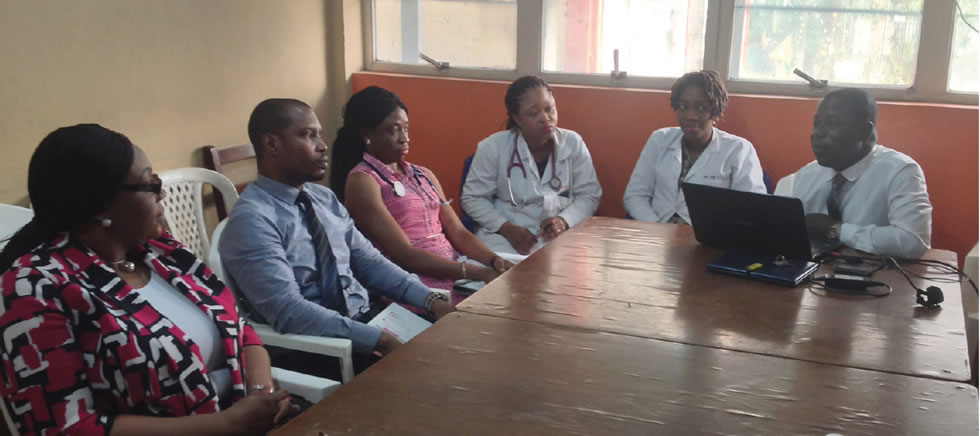Original article by Prof. Njideka U. Okubadejo published 06 March 2018, World Neurology Vol 33 No.1
Use of Continuum® in the residency training curriculum in Nigeria
Neurology training at the Lagos University Teaching Hospital (LUTH) Nigeria is conducted using the guidelines of and under accreditation of the West African College of Physicians and the National Postgraduate Medical College of Nigeria.
The training features two stages: Junior Residency (initial 24 months in internal medicine, inclusive of a mandatory three-month rotation in neurology) and Senior Residency (specifically, for specialization in neurology, an additional 36 months in general neurology, including rotating through relevant subspecialties).
The LUTH program is one of the largest in Nigeria, and has an average of 90 resident doctors in internal medicine at any point in time. Of these, about half are junior residents, five are neurology senior residents, and the rest are senior residents in various specialties, such as cardiology and endocrinology who mandatorily undertake rotations in neurology also. The Neurology Unit also trains residents rotating from neurosurgery, ophthalmology, family medicine, anesthesia, and psychiatry.
The training format includes clinical teachings (outpatient and inpatient setting), self-directed learning, didactic lectures, grand rounds, postgraduate seminars, journal reviews, and conference attendances.
Implementation
The American Academy of Neurology’s (AAN’s) Continuum Lifelong Learning in Neurology® has been provided by a joint program of the World Federation of Neurology (WFN) and AAN to our training program for about nine years. During the early years of its use, neurology residents and the trainers (consultant neurologists) used the journal as part of the recommended reading and material for postgraduate seminars.
Over the course of the last four years, with increased appreciation of the systematic, logical, and comprehensive nature of the journal articles, the unit has formalized the use of Continuum in these ways:
- Continuum-Based Early Bird Seminars: This is a year-round postgraduate seminar held on most Tuesday mornings from 8 a.m.– 9:30 a.m. The seminar topic is preselected from Continuum, topics are distributed to be read by all, and presented by one of the neurology senior residents. The seminar is attended by 10 to 12 residents rotating through the unit at the time, with consultants in attendance also. The format is via PowerPoint presentation, with interactions (questions, clarifications), and a brief post-test of a few (four to five) multiple-choice questions (MCQs) based on the content for the day.
The residents have indicated that the sessions are valuable, and have improved their understanding and knowledge because of the combination of functional/anatomical/pathophysiological basis, real-world symptoms-based algorithms/approach to common neurological complaints, updates on classifications, diagnostic criteria, and evidence-based treatment guidelines. In addition, the post-reading MCQs and patient management problems with responses improve the understanding of the material. - Incorporation of Continuum Into Training Curriculum: As the chair of the Neurology Subspecialty of the National Postgraduate Medical College of Nigeria, in our recent curriculum revision, I have included the Continuum journal as part of the recommended reading material for all residents training in neurology. This is in recognition of the invaluable content delivered by global experts in each subject, and the realisation that, with this exposure, our residents have access to a journal that is easily the best educational content for any training or practicing neurologist.
Examiners at the postgraduate examinations have continued to be impressed by the level of knowledge displayed by our trainees, and how well rounded and balanced they are in their clinical approach, diagnostic evaluation, and grasp of evidence-based treatment modalities. Much of this is a testament to the ease of access to the comprehensive, up-to-date, yet clinically relevant compilation of neurology contained in the Continuum series. In the foreseeable future, as there is a plan to harmonise training curricula of all of the postgraduate medical colleges across the West African sub-region, it is highly probable that this existing curriculum recommendation will be reflected in the West African Neurology Training curriculum as well.
Recommendations
I strongly appeal that the program be continued. The level of confidence that comes from knowing that one is learning from global experts, and the knowledge is at par with what other neurologists globally are learning, is a boost to the confidence of our trainees and ourselves.
I also appeal that to further enhance the use of this access program, institutional access is considered for participating institutions to enable the residents have access to electronic versions of the journal. This would remove the need to make copies for individual readers and also make it easier to study the material in this electronic age. I understand that there would need to be restrictions to ensure that the access is not misused. ■
At time of publishing, Prof. Okubadejo is a consultant neurologist at the Lagos University Teaching Hospital and subspecialty chair (neurology) at the National Postgraduate Medical College of Nigeria.









